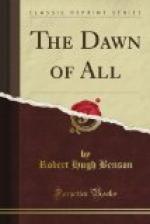There was a pause.
“I really think we’ve got at the principles,” said the priest again, meditatively. “Are they clear to you?”
Monsignor rose.
“I think so,” he said. “I’m very much obliged, Father. I’m sorry I was stupid just now; but you know it’s extraordinarily bewildering to me. I still don’t seem to be able to grasp all you said about Democracy.”
The old priest smiled reassuringly.
“Well, you see, the universal franchise reduced Democracy ad absurdum fifty years ago. Even the uneducated saw that. And then there came the reaction to the old king-idea again.”
Monsignor shook his head.
“I don’t see how the people ever consented to give up the power when once they’d got it.”
“Why, in the same way that kings used to lose it in the old days—by revolution.”
“Revolution? Who revolted?”
“The many who were tyrannised over by the few. For that’s what democracy really means.”
Monsignor smiled at what he conceived to be a paradox.
“Well, I must go to the Cardinal,” he said. “It’s just on ten o’clock.”
CHAPTER II
(I)
It was three weeks later that the Benedictines took formal possession of Westminster Abbey, and simultaneously that Pontifical High Mass was sung in the University churches of Oxford, Cambridge, and Durham, to mark the inauguration of their new life.
Monsignor Masterman was appointed to attend upon the Cardinals in the Abbey; and as he awoke that morning, it seemed to him once more as if he were living in a dream of strange and intoxicating unreality. Everywhere in the house, as he passed along the corridors, as he gave and received last instructions before starting, there seemed the same tension of expectancy. Finally, as he went up to the Cardinals’ rooms to announce the start, he found the two prelates, both in their scarlet, sitting in silence, looking out over the crowded silent streets.
He bowed at the door without speaking, and then, turning, led the way.
As they came down to the door where the horsed State carriages were waiting, for a moment the wall and the avenue of faces, in front and to right and left, struck him almost with a sense of hostility. A murmur that was almost a roar greeted the gleam of scarlet as the Cardinals came out; then silence again, and a surge of down-bent heads as the two raised their hands in blessing.
Monsignor himself sat facing the Cardinals in the glass coach, as at a foot-pace the six white horses, with grooms and postillions, drew them slowly past the long length of the Cathedral, round to the right, and into Victoria Street. There he drew a long breath, for he had never seen or dreamed of such a sight as that which met him. From end to end of the side street, and in the direction of Old Victoria Station, across the roadway as well, from every window




